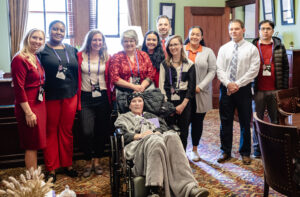 Last month the GAO Advisory Committee met to evaluate our 2017 efforts and to plan for 2018. The Advisory Committee is made up of representation of every practice in NC as well as representation from CMO and GAO. Below is a summary of their findings and the priorities for 2018.
Last month the GAO Advisory Committee met to evaluate our 2017 efforts and to plan for 2018. The Advisory Committee is made up of representation of every practice in NC as well as representation from CMO and GAO. Below is a summary of their findings and the priorities for 2018.
2017 Legislative Accomplishments
With your help we accomplished the following:
• Secured an increase for Medicaid aide services under the Personal Care Services (PCS) Program and the Community Alternatives Program for Children (CAP-C) from $13.88 to $15.52, effective August 1, 2017, and to $15.60 effective January 1, 2018. BAYADA impact: $300K annually. These increases will allow us to hire and retain more quality staff.
• Protected Certificate of Need (CON) and prevented its elimination from health care. Also prevented the Continuing Care Retirement Communities (CCRCs) from operating a home health agency without a CON. The CCRCs were seeking a carve-out from CON statute. Four separate bills were filed to eliminate this statute. BAYADA impact: Protected 5 service offices that serve Medicare clients. This issue is likely to re-surface in 2018.
• Secured a 7.5% tax exclusion for health care services on all revenue.
BAYADA impact: All 54 NC service offices will save a collective $12.6M annually.
2018 Key Legislative Priorities:
• Amend the Community Alternatives Program for Disabled Adults (CAP-DA) budget neutrality language to allow the aide rate to be increased from $13.88 to $15.60 to align with the PCS and CAP-C rate increases effective Oct. 1, 2018, by Q4-2018.
• Secure a $1.40 increase for all Medicaid aide services from $15.60 to $17.00 effective Jan. 1, 2019, by Q3-2018.
• Prevent the elimination of Certificate of Need (CON) for home health or hospice by Q3-2018.
• Ensure that the Medicaid Transformation waiver includes a rate floor provision and language that ensures access to quality care and minimal administrative burden by Q4-2018.







